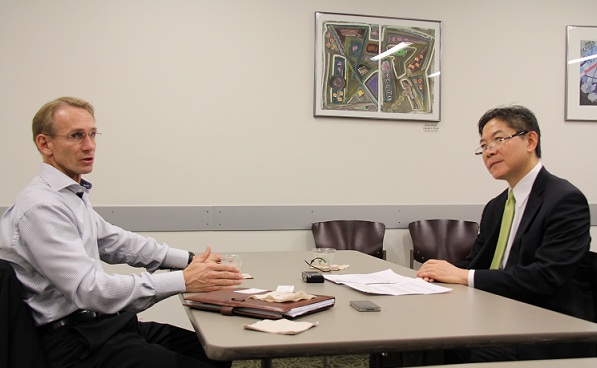By Barry Wong, Esq.

Honeywell Aerospace Asia-Pacific President Briand Greer (L) shares his experiences and knowledge with Valley leader, Barry Wong (R).
In advance of a symposium ”Working with China in the Global Market” hosted by Arizona State University’s Confucius Institute, Asian American Times was granted an exclusive interview with Briand Greer, President, Honeywell Aerospace Asia-Pacific; this writer conducted the interview and this article follows therefrom.
While many American and western companies conducting business with China today are ”newcomers” in the past three decades, Honeywell’s presence dates back to 1935. The company understands and aligns with China’s strategy of a long term vision.
”Honeywell in China” More recently in 2003, Honeywell International’s Board Chairman made a significant commitment to doing business in China by moving its Honeywell Aerospace Asia-Pacific Headquarters to Shanghai. Following its move the company proceeded to invest $1 Billion in its China Aerospace operations where it now employs over 700 employees including over 400 engineers.
Honeywell Aerospace is headquartered in Phoenix, Arizona with annual revenue exceeding $12 Billion, over 38,000 employees worldwide and over 100 global manufacturing and service sites. The Aerospace division grew through acquisitions in the Phoenix area combining familiar companies including Garrett AiResearch, Sperry and Allied-Signal.
”China New Airplane C919” China recently embarked on a bold program to develop and build its own commercial airplane to compete with the dominant manufacturers Boeing and Airbus. The initial model is referred to as C919 and is comparable to the single aisle Boeing 737 and Airbus A320. Honeywell Aerospace successfully bid on providing major operational components for the C919. It will develop, manufacture, install and service the C919 navigation system, auxiliary power units, flight by wire flight control system (auto-pilot) and landing gear assemblies; the contract life is valued at $16 Billion.
China’s entry into the airplane manufacturing market could not be better timed. Boeing recently released its new aircraft demand forecast for the next 20 years: the Asia-Pacific Region will need 12,820 new commercial airplanes valued at $1.890 Trillion; China, alone, will need 6,000 new commercial aircraft valued at $780 Billion. The C919 is projected to fulfill 12% of the new demand in China.
”Doing Business in China”Entry into the China market can be daunting for any company. Honeywell Aerospace Asia-Pacific formed a joint venture (JV) partnership with a Chinese State-Owned Enterprise to jointly bid and develop components and systems for the C919. Western companies desiring to enter China may want to partner with a local company to help in working through the legal, regulatory and political systems and requirements. Regarding transfer of technology through JVs, such transfers will inevitably occur in a JV therefore it is imperative that companies stay ahead by continuing to innovate through research and development.
”Cultural Competency”Honeywell and its expatriate employees learned early the importance of understanding and embracing the structures and norms of the local culture where they conduct business. Understanding the local culture in China is advantageous and helpful though not a guarantee of success. With regard to the U.S. Foreign Corrupt Practices Act (illegal to bribe foreign officials) Honeywell is well aware of the law and makes conscious efforts to inform and educate its employees on not running afoul of the law. Honeywell’s corporate integrity is paramount and the company will guard and protect it. China’s new leaders have embarked on a campaign to reduce and stop public official corruption. This new policy directive hopefully will help relieve pressures on foreign companies from unscrupulous officials and companies. Succeeding in China is possible while also complying with the FCPA.
”China Presence Required”‘ ”Any business desiring to be global must be in China,” said Briand Greer, President, Honeywell Aerospace Asia-Pacific. China, the second largest economy in the world, will continue to expand; any global business without a presence there will be at a disadvantage.
Mr. Greer is a graduate of the U.S. Naval Academy receiving a Bachelor’s Degree in Political Science and International Affairs. He also holds an MBA from Duke University and his further academic experience includes graduate level management studies at Harvard University, the University of Tennessee and with the U.S. Department of Commerce.
打开微信扫一扫
点击右上角分享
此文章到朋友圈




